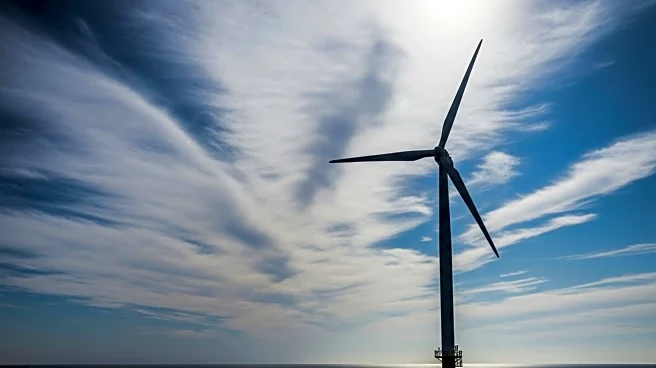What's Happening?
The Trump administration has filed a request with a federal court to cancel the approval of a $6 billion offshore wind project planned off the coast of Maryland. This move is part of a broader effort by President Trump to halt the development of offshore clean energy resources. The U.S. Department of the Interior’s Bureau of Ocean Energy Management (BOEM) is seeking to void the permit granted to the Maryland Offshore Wind Project. The BOEM cited an underestimation of the impact on search-and-rescue operations and commercial fisheries as reasons for the reconsideration of the permit, which was initially approved under the Biden administration. The Maryland project, developed by US Wind, involves the construction of up to 114 turbines approximately 10 nautical miles off the coast of Ocean City, Maryland. US Wind is owned by funds managed by Apollo Global Management and a subsidiary of Toto Holding SpA.
Why It's Important?
The cancellation of the Maryland Offshore Wind Project could have significant implications for the U.S. renewable energy sector. Offshore wind projects are a critical component of efforts to transition to cleaner energy sources and reduce carbon emissions. The Trump administration's actions reflect a continued opposition to wind power, which could hinder progress in achieving national and global climate goals. The decision may also impact economic stakeholders, including companies involved in the development and construction of wind farms, as well as local communities that might benefit from job creation and economic growth associated with such projects. Additionally, the move could set a precedent for future energy policy decisions, influencing the direction of U.S. energy strategy.
What's Next?
The federal court's decision on whether to cancel the permit will be a key factor in determining the future of the Maryland Offshore Wind Project. If the permit is voided, it could delay or halt the project entirely, affecting timelines and financial investments. Stakeholders, including environmental groups, industry leaders, and local governments, are likely to respond to the administration's actions, potentially leading to legal challenges or advocacy efforts to support renewable energy initiatives. The outcome of this case could influence the regulatory environment for future offshore wind projects in the U.S.











